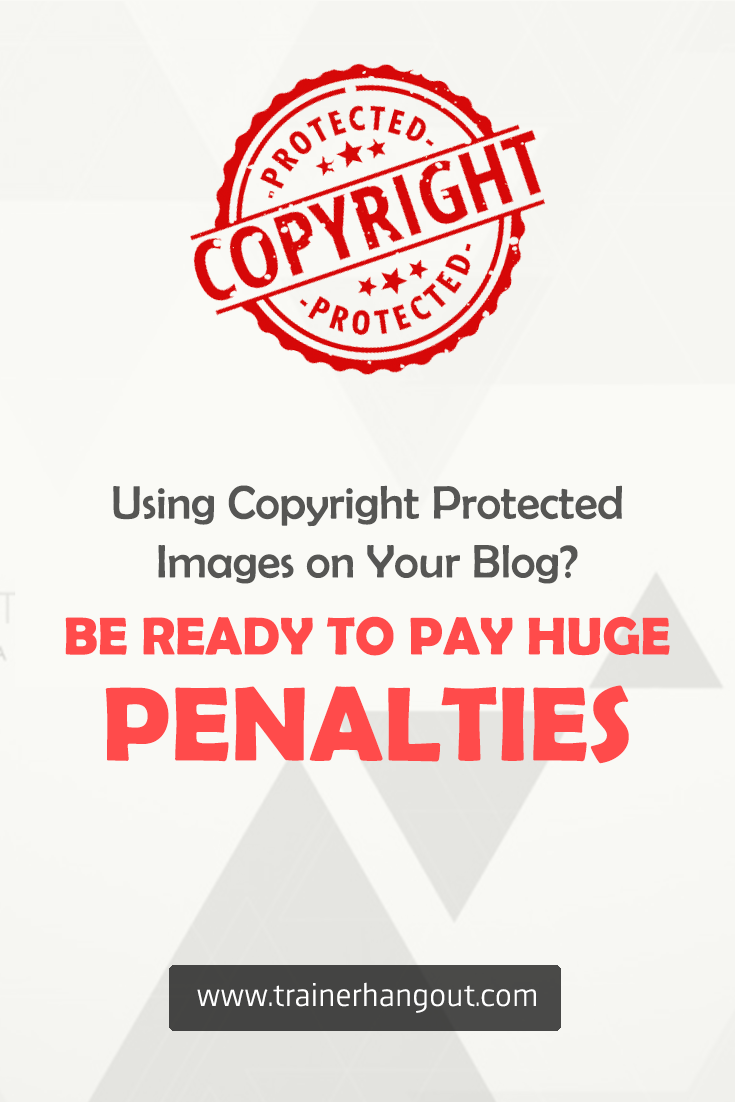Imagine you’re having a regular day at work, sipping coffee at your desk. You open your mailbox and the first email you see is from an attorney. It’s a legal notice. Someone’s suing you for $5000 for using one of their images on your blog. Coughing up thousands of dollars for a $20 image sounds lame. But that’s exactly what can happen if you are unaware of the law.
A year ago, when I first started writing, I had very little idea about content copyright and image copyright laws. It was during my training days, that I’d written a blog about time management. It was one of my first blog posts to be published. When I was about to upload it on to our site and publish it, my mentor asked me where I’d taken the image from. I told him I found it on the internet and pasted it.
He sat me down and said, ‘This is the worst mistake that you could make as a blogger. You might write the poorest blogs, and that would still be okay. But copying images on your blog from open sources like Google is one of the worst mistakes you can make.’
Using a copyrighted image without permission can not only have you facing legal charges, but can also leave a dent on your wallet. It sounded ridiculous that copying something as simple as an image could have such big repercussions. But, yes. It is a fact, and it can happen to anybody.
Knowing the rules and laws can save you a lot of heartache.
What is Image Copyright Infringement?
Simply put, Copyright is ‘the right to copy’. So, basically, if someone copyrights his images (or any original work), he is restricting others the right to copy them. And, if you want to use a copyrighted image, you’ll need to get the owner’s permission. So, copyright gives the owner the legal protection for his work.
A creator’s original work is automatically copyrighted, whether he registers it or not. If he clicks a photograph, he owns the copyright to that work even if he does not register it.
The Digital Millennium Copyright Act, which is very similar to the Copyright Act, offers protection against online content like eBooks, websites, photographs, music, etc. Under the DMCA, you must request the copyright owner’s permission before you copy an image from a website, use an image on your website, or send an image as an email attachment. Any violations, are subject to penalties ranging from $200 to $150,000, and the infringer can also be put behind bars in extreme cases.
Sounds scary, doesn’t it? Who would pay a thousand dollars for a minor fault of using someone’s copyrighted image? Original work holds value, and it must be used with the permission of the owner. There’ve been instances where infringers have had to pay $8000 as penalties.
But that is how the law is, and we must obey the law. However, there are circumstances where you can use someone else’s images freely, without the risk of being sued and defamed.
- If you can prove that the image was freely licensed, meaning the owner has released the image under acceptable free license, making it free for others to use.
- If the image is available in a public domain, making it free of all copyrights.
- If the image is copyrighted, but you are using it for special nont-profit reasons, making it a fair use of the licensed material.
How to Use Images Safely?
Sometimes you might just be unaware of the laws, and anyone can make an honest mistake of copying a licensed image. The consequences of this honest mistake, however could be a nightmare. It is always better to play safe, and stay away from from legal issues. Here are a few ways, you can use images safely.
Creative Commons
Creative Commons (CC) is a non-profit organization that provides free license to creators to make their original work publicly available under defined conditions. So, when you’re using an image released by someone under a CC license, you know what you can and cannot do with that image, and can use it safely.
It is important to be aware of the types of Creative Commons licenses.
Creative Commons Zero (CC0)
CC0 is a type of license where the owner releases his work without any copyrights. Images licensed under CC0 are the safest to use. You can use these images freely for all personal and commercial uses without attribution to the original creator.
Attribution
Attribution basically means giving the original author of the content the credits for their work. Under this type of license, you are free to copy, remix, display and distribute an image, unless and until you are giving credits to the original photographer.
Attribution-Share-Alike
You can freely copy, share, or distribute images, as long as you pass the same copyright conditions as the original license, even after the image is distributed and shared. This simply means that sharing the image, modifying it, or using it for commercial or non-commercial uses will not take away the original license from it.
Non-Commercial License
You can only use images for non-commercial, non-profit uses. This is called ‘fair use.’. Using images licensed under this category for commercial use would be punishable.
No Derivatives
Images can be copied, shared and distributed for commercial and non-commercial uses, with due attribution. However, no moderation or remixes can be done to the original work.
Stock Photographs
Stock photographs are images sold by the owners for a small royalty fee to be used freely by the public for commercial and personal uses. There are hundreds of stock photography websites like Shutterstock, StockSnap.io, and FreeStock. You can either become a member on one of these websites, or purchase individual images at reasonable rates. Spending $10 on an image is always a wiser option than paying paying thousands of dollars in penalties.
Free Image Websites
Just like stock photography websites, there are websites which offer millions of images for free. Some of these allow you to use these images for free without attribution to the original creator. Check out our specially curated websites where you can download images for free here.
Public Domain Images
Public domain images are considered to be free of copyrights. These are images whose copyrights have either expired, or never existed in the first place. Since these images do not carry any copyrights or attribution rules, they are free to be used for personal, or commercial purposes. They are similar to the Creative Commons Zero images. You can find public domain images on several websites like Wikimedia Commons, Flickr Commons, Public Domain Pictures, Magdeleine, and ISO Republic.
Follow This Checklist to Safely Download and Use Images
We suggest that you go through the below checklist every time you’re about to download an image from the internet.
- Identify the purpose you’re going to use the image for.
- Understand image copyright basics.
- Some stock photographs and free image websites also have license restrictions on some of their pictures. Do not assume every image is free of copyright restrictions.
- When you’ve chosen a copyrighted image, go through the conditions attached with it and figure out what you can or cannot do with it.
- Ask for the owner’s permission to use the image whenever you are in doubt.
- Give due credits to the owner whenever possible.
Sometimes, not knowing the law can cost you a lot of money. Dealing with images is a tricky business. Understanding copyright laws and abiding by them could save you uninvited trouble and a lot of your money.





